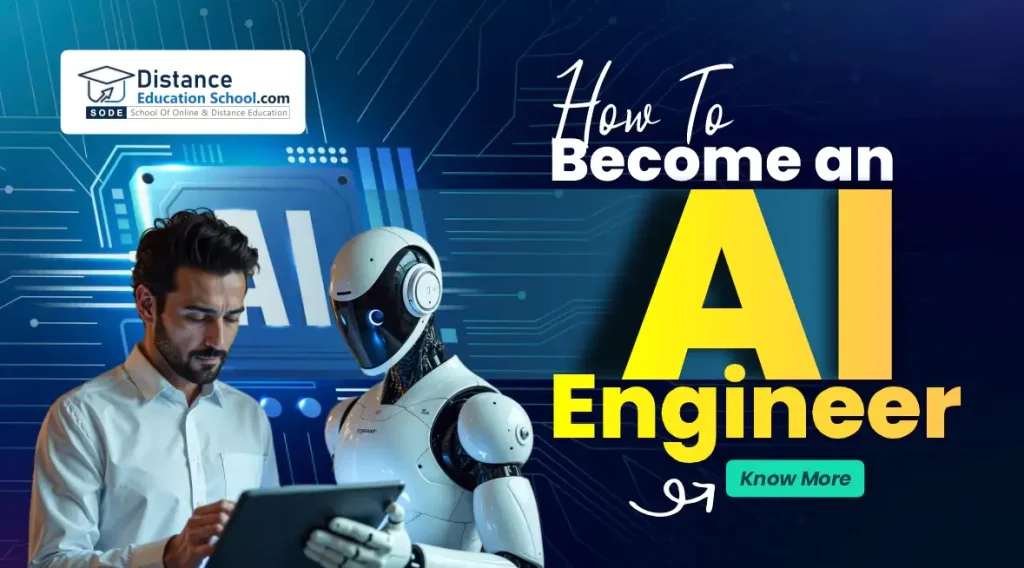
How to Become an Al Engineer in 2026
Artificial Intelligence (AI) is changing industries faster than ever, making AI engineering one of the most popular careers today. With progress in automation, machine learning, and deep learning, companies are looking for AI experts who can create, use, and improve smart systems. As AI technology continues to evolve, the demand for skilled professionals is only set to grow, offering interesting opportunities across various sectors.
If you want to become an AI Engineer in 2026, this blog will help you understand the education, skills, and job opportunities needed to start your career.
What Does an AI Engineer Do
An AI Engineer designs, develops, and deploys AI-powered applications and systems. They work on machine learning algorithms, deep learning models, and data-driven solutions that improve business operations and user experiences. AI Engineers also focus on creating intelligent automation systems, predictive analytics, and natural language processing applications.
Industries Where AI Engineers Are Needed
AI engineering is changing many industries and creating many job opportunities. As companies start using AI, the need for skilled AI engineers is increasing. Here are some important industries where AI engineers are needed:
Healthcare: AI helps in diagnosing diseases, assisting in robotic surgeries, and creating personalized treatments. It can also predict illnesses and improve treatment plans.
Finance: AI detects fraud, helps in stock market trading, and assesses risks. It can quickly analyze large amounts of financial data.
E-commerce: AI improves customer experience with chatbots and personalized product suggestions.
Automotive: AI is used in self-driving cars and vehicle maintenance. Smart sensors and decision-making systems help automate driving.
Cybersecurity: AI helps detect threats and prevent cyberattacks by finding security weaknesses
Salary and Career Growth of AI Engineer
AI Engineers are among the highest-paid professionals in the tech industry due to the growing demand for AI-driven solutions across various sectors. The salary of an AI Engineer depends on factors such as experience, location, and industry.
| Experience Level | India | USA | UK |
|---|---|---|---|
| Entry-Level (0-2 years) | ₹8-12 LPA | $90,000 – $120,000 per year | £45,000 – £70,000 per year |
| Mid-Level (3-5 years) | ₹15-25 LPA | $120,000 – $160,000 per year | £70,000 – £100,000 per year |
| Senior-Level (5+ years) | ₹30-50 LPA+ | $160,000 – $250,000 per year | £100,000 – £150,000 per year |
Key Skills Needed to Become AI Engineer
To become an AI engineer, you need strong technical and problem-solving skills. Along with programming, AI engineers should know about machine learning, data analysis, and creating algorithms. Here are the important skills you need to succeed in this field.
| Category | Skills |
|---|---|
| Technical Skills | Programming Languages: Proficiency in Python (most popular for AI/ML), R, Java, and C++ is essential. |
| Mathematics & Statistics: Strong knowledge of Linear Algebra, Probability, Calculus, and Optimization. | |
| Machine Learning & Deep Learning: Understanding different ML algorithms, neural networks, reinforcement learning, and natural language processing (NLP). | |
| Data Structures & Algorithms: Crucial for optimizing AI models, handling large datasets, and improving efficiency. | |
| Cloud Computing & Big Data: Experience with AWS, Google Cloud, Azure, and Big Data tools like Apache Spark and Hadoop. | |
| DevOps & MLOps: CI/CD pipelines, Kubernetes, Docker, and TensorFlow Serving to deploy and manage AI models efficiently. | |
| Soft Skills | Problem-Solving & Critical Thinking: Important for fixing AI problems and improving solutions. AI engineers must think logically to create efficient and smart systems. |
| Communication & Teamwork: Needed to work with different teams and use AI in projects. Clear communication helps in explaining AI solutions to non-technical team members. | |
| Adaptability & Continuous Learning: AI is changing fast, so it’s important to keep learning new things. Staying updated with the latest AI tools and trends helps in career growth. |
AI Engineering Courses in India
Artificial Intelligence (AI) is changing many industries, making AI engineering a great career option. To become an AI engineer, you need to learn programming, math, and machine learning. AI engineering is growing fast in India, and there are many ways to study it. Here is a simple guide to help you start a career in AI engineering.
| Category | Details |
|---|---|
| Bachelor Degree Options | B.Tech in Artificial Intelligence (AI): A 4-year degree covering AI, machine learning, deep learning, and natural language processing. Offered by IITs, NITs, and other top universities. |
| B.Tech in Computer Science with AI & ML Specialization: Focuses on AI technologies like machine learning, deep learning, and cloud computing, along with practical model development. | |
| BSc in Data Science, Mathematics, or Statistics: Builds a strong mathematical foundation for AI model development and real-world applications. | |
| Master Degree & Specializations | MS in AI, Machine Learning, or Data Science: Covers advanced AI concepts, big data analytics, and model optimization for research and industry applications. |
| MBA in AI and Analytics: Designed for professionals interested in applying AI in business strategy and decision-making. | |
| Master and PhD Programs in AI: Advanced research-based programs focusing on AI innovations and developments. | |
| Online Courses & Certifications | Google AI Certification: Covers deep learning, TensorFlow, and AI model deployment. |
| Microsoft AI Engineer Associate: Focuses on AI solutions, cloud-based machine learning, and AI applications using Azure. | |
| Coursera, Udacity, edX Courses: Offers AI and ML courses from top universities like Stanford, MIT, and Harvard. | |
| IBM AI Engineering Certification: Covers machine learning, deep learning, and AI deployment strategies. | |
| Fast.ai: A free deep learning course providing practical AI knowledge. | |
| Bootcamps and Short-Term Courses | Udacity AI Nanodegree: Provides hands-on experience in neural networks, NLP, and computer vision. |
| Springboard AI/ML Bootcamp: Includes AI training with career mentorship. | |
| MIT AI Professional Certificate: Covers industry-relevant AI applications. | |
| DataCamp AI Specialization: Offers AI programming, machine learning, and ethical AI development training. | |
| Top AI Institutions in India | IITs & NITs: IIT Madras, IIT Kharagpur, IIT Hyderabad, NIT Surathkal, NIT Rourkela. Many other universities also offer specialized AI courses. |
Networking and Career Growth in AI Engineering
Building a successful career in AI engineering requires more than just technical skills. Networking with professionals in the field and staying updated with the latest trends can open doors to new opportunities. Below are some key ways to improve your career growth in AI engineering.
| Category | Details |
|---|---|
| Building Connections | Attend AI Conferences: Participate in top AI conferences like NeurIPS, ICML, and CVPR to network with experts and learn about the latest advancements. |
| Join AI Communities: Engage in AI discussions on LinkedIn, Reddit, and Discord to connect with professionals and stay updated on industry trends. | |
| Follow AI Experts: Stay informed by following AI experts and participating in discussions on platforms like Medium and Twitter. | |
| Hackathons & Competitions | Join AI Hackathons: Take part in AI competitions such as Google AI Hackathons and NVIDIA AI Challenges to gain hands-on experience and industry recognition. |
Best Career Paths for AI Engineering Degree Holders
AI engineering degree provides you with the skills to excel in various high-demand industries. With the rapid growth of AI technology, numerous career paths are available to them. AI engineering salary is also highly competitive, reflecting the growing demand for their expertise. Below are some of the best career options for AI engineering degree holders.
1. Machine Learning Engineer
Machine learning engineers design and build algorithms that enable systems to learn from and make decisions based on data. They work with large datasets and algorithms in various industries to develop predictive models and automated systems.
- Salary Range: ₹6,00,000 to ₹20,00,000 per year
- Industries: Technology, Finance, Healthcare, E-commerce, Automotive
3. Data Scientist
Data scientists analyze data to extract insights and inform business decisions. They use machine learning models to predict trends and solve complex business problems, making them vital across various sectors, including finance and healthcare.
- Salary Range: ₹8,00,000 to ₹25,00,000 per year
- Industries: Finance, Retail, E-commerce, Healthcare, Consulting
3. AI Research Scientist
AI research scientists develop new algorithms and techniques that push the boundaries of artificial intelligence. Their work often focuses on foundational research to improve AI’s capabilities, especially in areas like deep learning and reinforcement learning.
- Salary Range: ₹10,00,000 to ₹35,00,000 per year
- Industries: Research Institutions, Academia, Technology Companies, Startups
4. Robotics Engineer
Robotics engineers design robots and autonomous systems that can carry out tasks traditionally done by humans. AI plays a major role in enabling these robots to operate autonomously and efficiently, especially in industries like manufacturing and healthcare.
- Salary Range: ₹7,00,000 to ₹22,00,000 per year
- Industries: Manufacturing, Automotive, Aerospace, Healthcare, Defense
5. AI Product Manage
AI product managers oversee the development of AI-powered products. They coordinate between engineering teams, business leaders, and customers to ensure that AI solutions meet market needs and align with company goals.
- Salary Range: ₹12,00,000 to ₹35,00,000 per year
- Industries: Technology, E-commerce, Finance, Consulting, Startups
6. AI Consultant
AI consultants help organizations integrate AI into their operations. They assess business needs and advise on how to implement AI technologies to improve efficiency, reduce costs, and gain competitive advantages in various industries.
- Salary Range: ₹10,00,000 to ₹30,00,000 per year
- Industries: Consulting, Technology, Healthcare, Finance, Retail
7. AI Software Engineer
AI software engineers build and maintain software applications that use AI technologies. They work on designing, developing, and deploying AI models, which are used in areas like natural language processing, computer vision, and predictive analytics.
- Salary Range: ₹6,00,000 to ₹18,00,000 per year
- Industries: Software Development, E-commerce, Technology, Finance
Future Trends in AI Engineering (2026)
- Growth of Generative AI: Tools like ChatGPT, DALL-E, and AI-generated content creation.
- Explainable AI (XAI): Ethical AI development and transparent decision-making models.
- AI in Robotics & Automation: Increasing role of AI in robotics, drones, and autonomous systems.
- Edge AI & IoT Integration: AI-powered smart devices, wearables, and real-time computing applications.
Conclusion
Becoming an AI Engineer in 2026 requires a combination of technical expertise, continuous learning, and hands-on experience. By following the right educational path, mastering AI tools, and networking with industry professionals, you can build a rewarding career in AI. As AI continues to evolve, now is the best time to enter this interesting and high-paying field.
Most Popular Blogs

Online BCA Courses in Jain University Online

Distance Education at Pondicherry University

Top 4 colleges to pursue Distance BBA in Andhra Pradesh

What are the top distance BSc colleges in Kerala

Know about the top 3 distance BCom universities in Madhya Pradesh



















